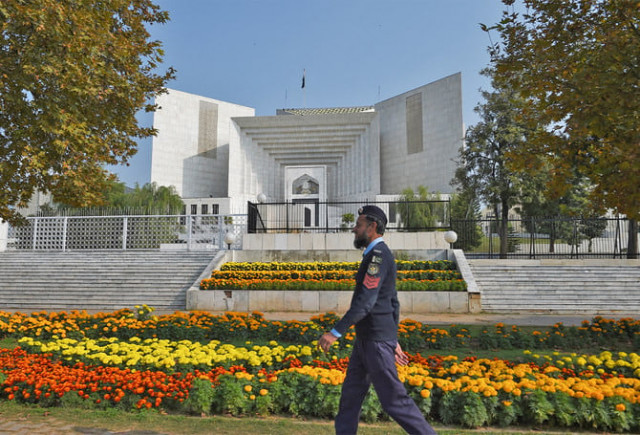Judges who delay cases, verdicts may be guilty of misconduct: SC
Top court also asks judiciary to inscribe date on every order when it was written, signed and pronounced

The Supreme Court has held that judges, who delayed cases and did not write judgments within a reasonable time, might be guilty of misconduct.
The SC also asked the superior court judges to inscribe the date on every order and judgment when it was actually written, signed and pronounced.
"Any impression that judges want to escape criticism or accountability by not inscribing the date on a belatedly written judgment must be assiduously dispelled,” read a 10-page judgment authored by Justice Qazi Faez Isa.
“This court must lead by example and do away with the practice, sometimes resorted to, of not inscribing the date when a judgment is actually written, signed and pronounced. This court holds judges of other courts to account, therefore, it is all the more incumbent upon it to abide by the same standard,” it added.
A copy of the judgment was sent to all superior court judges.
The apex court was determining three questions: whether or not a judgment has to be dated and what are the consequences if one does not mention the date when it was written, signed and pronounced.
Thirdly, the judgment also countered a question when a judgment, which did not mention when it was written, signed and pronounced, was challenged should the surrounding circumstances and record be considered to determine whether or not it had been moved against within the prescribed period.
A three-judge bench of the apex court, led by Justice Isa, adjudicated these questions to resolve anomalous situations.
Justice Isa referred to an earlier SC judgment wherein it was observed that judges who neither decided cases quickly and nor wrote judgments within a reasonable time might be guilty of misconduct.
He did so by referring to the Judges Code of Conduct.
"It may be that the date is not inscribed on the judgment when it was written, signed and pronounced to circumvent the directions of this court to write judgments within a reasonable time and/or to escape, as observed by this court, the consequences of such misconduct. We are conscious of the fact that no one should be prejudiced due to an act of a court. Therefore, when judgments are belatedly written or wherein the date of signing and pronouncement is not mentioned, its consequences should not be suffered by litigants. Accordingly, the answers to the said three questions should not be construed to undermine the right of litigants,” the verdict read.
The court held that the pronouncement of a judgment did not simply mean the result of the case but also the reasons thereof.
“Simply announcing the result of the case after hearing it but before it is written, containing the grounds/reasons for the decision, does not constitute a judgment/decision. A judgment/decision explains how and why the court decided a case in a particular manner. This is also what Article 189 of the Constitution of the Islamic Republic of Pakistan states decision -- ‘Any decision of the Supreme Court shall, to the extent that it decides a question of law or is based upon or enunciates a principle of law, be binding on all other courts in Pakistan’,” the judgment stated.
The verdict noted that the Code of Civil Procedure, 1908 defined what a judgment was.
“[The term] ‘judgment’ means the statement given by the judge of the grounds of a decree or order.
The SC further observed that in connection with the original jurisdiction of a court, Order XX, rule 1(2) of the Code stipulated that the judgment should be pronounced in an open court, either at once or on some future day in respect whereof notice shall be given to the parties or their advocates.
It added that Order XX, rule 3 of the Code stipulated that the judgment shall be dated and signed by the judge in an open court at the time of pronouncing it.
"With regard to the appellate jurisdiction Order XLI, rule 30 of the Code stipulates that the court, ‘shall pronounce judgment in [an] open court, either at once or on some future day of which notice shall be given to the parties or their pleaders’.
And, Order XLI, rule 31 of the Code stipulates that the judgment ‘shall at the time that it is pronounced be signed and dated by the judge or by the judges concurring therein’. The abovementioned provisions of the Code clearly stipulate that a judgment, whether in a court’s original or appellate jurisdiction, must be dated. And, the pronouncement of a judgment does not simply mean the result of the case, such as, allowed, dismissed or any other variant, but, as stipulated in Section 2(9) of the Code, it is ‘the statement given by the judge on the grounds of a decree or order,” the judgment added.
Justice Isa, citing the Supreme Court Rules 1980, stated that an appeal before the SC was required to be filed within 30 days from the date of grant of certificate or the date of the impugned judgment, decree or final order.
He added that a petition for leave to appeal was required to be filed within 60 days of the judgment or decree or final order, as respectively provided by Order XII Rule 2 and Order XIII of the Supreme Court Rules, 1980.



















COMMENTS
Comments are moderated and generally will be posted if they are on-topic and not abusive.
For more information, please see our Comments FAQ